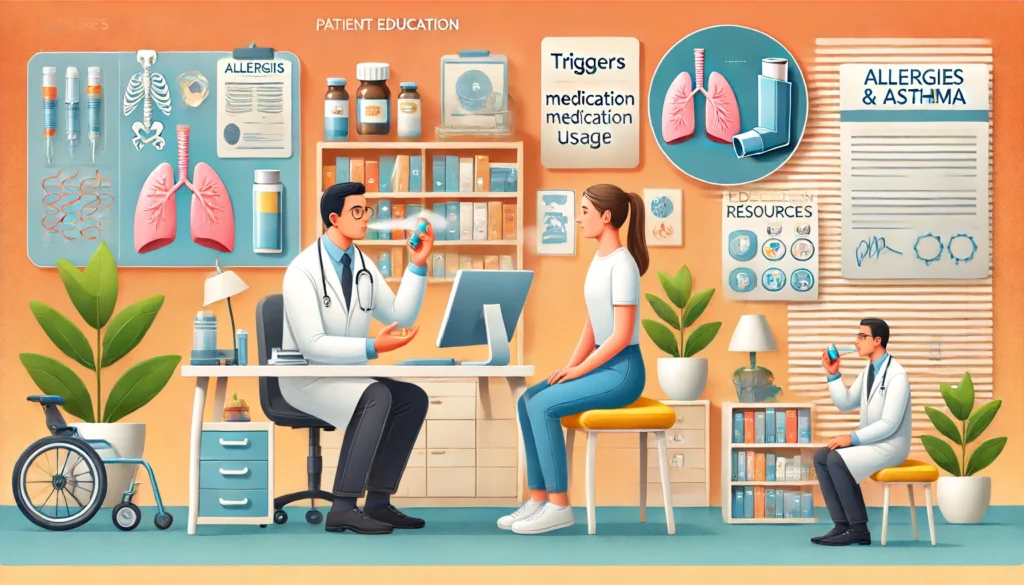Introduction
Living with allergies and asthma can present numerous challenges, significantly impacting daily life and overall well-being. However, effective relief and management are attainable with the right strategies and expert guidance. This comprehensive guide will delve into five proven strategies recommended by the Allergy and Asthma Center to help individuals better control their conditions and enhance their quality of life.
Understanding the Role of an Allergy and Asthma Center
What is an Allergy and Asthma Center?
An Allergy and Asthma Center is not just a medical facility but a specialized one dedicated to diagnosing, treating, and managing allergic conditions and asthma. Staffed by experienced allergists and pulmonologists, these centers offer advanced diagnostic tools and personalized treatment plans to address each patient’s unique needs. The comprehensive and personalized care provided by an Allergy and Asthma Center ensures that each patient feels valued and understood, instilling a sense of reassurance and confidence in their treatment.
Benefits of Choosing an Allergy and Asthma Center
Opting for an Allergy and Asthma Center is crucial due to their extensive and tailored care. These centers offer access to the latest treatments and therapies and employ multidisciplinary teams that can tackle every aspect of a patient’s condition. This ensures patients receive holistic and effective care tailored to their specific requirements. The specialized knowledge and experience available at an Allergy and Asthma Center are invaluable for those seeking to manage their symptoms and improve their overall health, providing confidence and reassurance in their decision.

Strategy 1: Accurate Diagnosis and Personalized Treatment Plans
The Necessity of Accurate Diagnosis
The cornerstone of effective allergy and asthma management is not just any diagnosis but an accurate one. Specialists at an Allergy and Asthma Center utilize various diagnostic tests to pinpoint the exact allergens and triggers affecting each patient. These tests may include skin prick, blood, pulmonary function, and more. Accurate diagnosis is not just important; it’s empowering. It equips the audience with knowledge about their condition, giving them a sense of control over their health and a hopeful outlook for effective relief.
Crafting Personalized Treatment Plans
Once the allergens and triggers are identified, the next step is formulating a personalized treatment plan. These plans are meticulously tailored to meet the individual needs of the patient and typically incorporate a combination of medications, lifestyle adjustments, and other therapies aimed at minimizing symptoms and preventing flare-ups.
Medications
Medications are often central to managing allergies and asthma. Depending on the severity of the condition, doctors at an Allergy and Asthma Center may prescribe various drugs, including antihistamines, corticosteroids, bronchodilators, and immunotherapy (allergy shots).
Lifestyle Adjustments
Equally necessary are lifestyle adjustments, which may involve dietary changes, avoiding specific environments, and using air purifiers to reduce indoor allergens. Patients may receive advice on modifying their living spaces and daily routines to minimize exposure to triggers and enhance their overall health.

Strategy 2: Environmental Control Measures
Minimizing Allergen Exposure
One of the most effective strategies for managing allergies and asthma is minimizing exposure to allergens. The Allergy and Asthma Center educates patients on identifying and avoiding common allergens such as dust mites, pollen, pet dander, mold, and certain foods.
Home Environment Control
Managing the home environment is crucial. This can include using hypoallergenic bedding, regular cleaning routines, and maintaining appropriate humidity levels to prevent mold growth. Patients are also advised to use air purifiers and keep windows closed during high pollen seasons to reduce indoor allergen levels.
Work and Outdoor Environment Control
Patients also receive advice on managing their environments at work and outdoors. This may involve using protective masks, avoiding outdoor activities during peak pollen seasons, and ensuring proper ventilation in workspaces. The Allergy and Asthma Center provides specific recommendations for creating a safe and healthy environment at home and work.
Implementing Allergen Control Strategies
These allergen control strategies can significantly reduce the frequency and severity of allergy and asthma symptoms. The Allergy and Asthma Center specialists provide detailed guidance and support to help patients make these necessary changes effectively. Regular follow-ups and adjustments to the plan ensure that patients can maintain a low-allergen environment over time.

Strategy 3: Regular Monitoring and Follow-Up
The Importance of Regular Monitoring
Regular monitoring is vital for the effective management of allergies and asthma. It helps track treatment progress, identify any changes in symptoms, and adjust the treatment plan as necessary. Consistent monitoring allows for early detection of potential issues and timely interventions to prevent severe complications.
Scheduled Follow-Up Appointments
Allergy and Asthma Center patients are scheduled for regular follow-ups to monitor their condition. These visits allow doctors to perform necessary tests, review the efficacy of the current treatment plan, and make any required adjustments.
Peak Flow Monitoring
For asthma patients, peak flow monitoring is a common practice. This involves using a peak flow meter to measure the airflow out of the lungs, helping to detect early signs of an asthma attack. Regular peak flow monitoring provides valuable data to inform treatment decisions and prevent exacerbations.
Symptom Tracking
Patients are also encouraged to maintain a symptom diary, noting any changes or potential triggers. This information is invaluable for doctors when modifying treatment plans. Keeping a detailed record of symptoms and triggers helps identify patterns and allows for more precise adjustments to the management plan.
Benefits of Regular Monitoring
Regular monitoring and follow-ups ensure that issues are promptly addressed, reducing the risk of severe flare-ups. It also allows patients to discuss concerns and receive ongoing education about their condition. Continuous monitoring fosters a proactive approach to managing allergies and asthma, leading to better long-term outcomes.

Strategy 4: Patient Education and Self-Management
Empowering Patients with Knowledge
Education is a fundamental component of effective allergy and asthma management. The Allergy and Asthma Center significantly emphasizes educating patients about their conditions, available treatment options, and self-management techniques. Empowering patients with knowledge enables them to actively participate in their health and make informed decisions about their care.
Understanding Triggers
Patients learn to identify and understand their triggers, which is crucial for avoiding them and preventing symptoms. Education on common allergens and how to reduce exposure is a vital part of this process.
Proper Medication Usage
Education also covers the proper use of medications, including how and when to take them, potential side effects, and what to do if a dose is missed. Understanding medication use is essential for effective symptom management and preventing complications.
Self-Management Techniques
Self-management techniques empower patients to take control of their condition. This includes knowing how to use inhalers correctly, recognizing early warning signs of an attack, and having an action plan.
Action Plans
An action plan is a personalized guide that outlines the steps to take in case of an asthma attack or severe allergic reaction. It includes information on when to take medications, seek medical help, and emergency contact numbers. A well-defined action plan ensures patients can respond quickly and effectively to potential emergencies.
Ongoing Support and Resources
The Allergy and Asthma Center provides ongoing support and resources to help patients stay informed and confident in managing their condition. This might include access to educational materials, support groups, and online resources. Continuous education and support help patients stay updated on new treatments and management techniques, enhancing their ability to live a healthy and active life.

Strategy 5: Integrative and Holistic Approaches
Combining Traditional and Alternative Therapies
Integrative and holistic approaches can enhance traditional medical treatments. The Allergy and Asthma Center often incorporates these methods to provide a more comprehensive care plan.
Nutrition and Diet
Proper nutrition plays a vital role in managing allergies and asthma. Patients might receive dietary advice to help reduce inflammation and avoid foods that can trigger symptoms. A balanced diet rich in anti-inflammatory foods can support overall health and reduce the severity of allergic reactions.
Stress Management
Stress can exacerbate allergy and asthma symptoms. Techniques such as yoga, meditation, and deep breathing exercises can help manage stress and improve overall well-being. Learning to manage stress effectively can reduce the frequency and severity of asthma attacks and allergic reactions.
Alternative Therapies
Some patients benefit from alternative therapies such as acupuncture, herbal remedies, and chiropractic care. These therapies can complement traditional treatments and provide additional relief. Patients at the Allergy and Asthma Center may explore these options under the guidance of their healthcare providers.
The Role of Physical Activity
Regular physical activity is essential for overall health and can help improve lung function. However, patients need guidance on how to exercise safely without triggering symptoms. The Allergy and Asthma Center provides personalized exercise recommendations tailored to each patient’s condition and fitness level. Engaging in regular physical activity can enhance respiratory health and overall well-being.

Conclusion: Achieving Optimal Health with the Allergy and Asthma Center
Managing allergies and asthma requires a comprehensive, individualized approach. Patients can benefit from accurate diagnoses, personalized treatment plans, environmental control measures, regular monitoring, patient education, and integrative approaches by choosing an allergy and asthma center. Combined with the expertise and support of specialized medical professionals, these strategies can significantly improve quality of life.
Living with allergies and asthma doesn’t have to mean constant discomfort or fear of flare-ups. Effective relief and management are within reach with the right strategies and support from an Allergy and Asthma Center. By implementing these five proven strategies, patients can take control of their health and enjoy a better quality of life.
The journey to managing allergies and asthma is continuous, but it is possible with the right tools and support. Trust in the specialized care an Allergy and Asthma Center provides to guide you every step, ensuring you live a healthier, happier life. Whether you are dealing with seasonal allergies, chronic asthma, or severe allergic reactions, the Allergy and Asthma Center is equipped to provide the relief and management you need to lead a fulfilling life.
In conclusion, the comprehensive approach provided by an Allergy and Asthma Center encompasses a wide range of strategies and resources designed to offer practical relief and long-term management of allergies and asthma. From accurate diagnosis and personalized treatment plans to advanced environmental control measures and integrative health practices, these centers are dedicated to improving the lives of their patients. With ongoing education, support, and cutting-edge treatments, the Allergy and Asthma Center stands as a beacon of hope and health for those affected by these challenging conditions.
Frequently Asked Questions about Allergy and Asthma Center
Q. What is the Allergy and Asthma Center Islamabad, and what services do they offer?
A. The Allergy and Asthma Center Islamabad specializes in diagnosing, treating, and managing allergies and asthma, offering advanced diagnostics and personalized treatment plans.
Q. What are the fees at the Allergy Center Islamabad?
A. Fees vary depending on services like consultations, tests, and treatments. Contact the center directly for detailed information.
Q. What are the locations and services of other Allergy and Asthma Centers, such as those in Lahore, Smyrna, and Dupont?
A. Centers in Lahore, Smyrna, and Dupont provide similar specialized care for allergies and asthma, with advanced treatments and patient education.
Q. What is the Allergy and Asthma Center patient portal, and how can it help me?
A. The patient portal offers access to medical records, appointment scheduling, prescription refills, and communication with healthcare providers.
Q. What is the role of the Pakistan Allergy Asthma and Immunology Society?
A. It is a professional organization focused on advancing allergy, asthma, and immunology practices in Pakistan through research, education, and advocacy.

